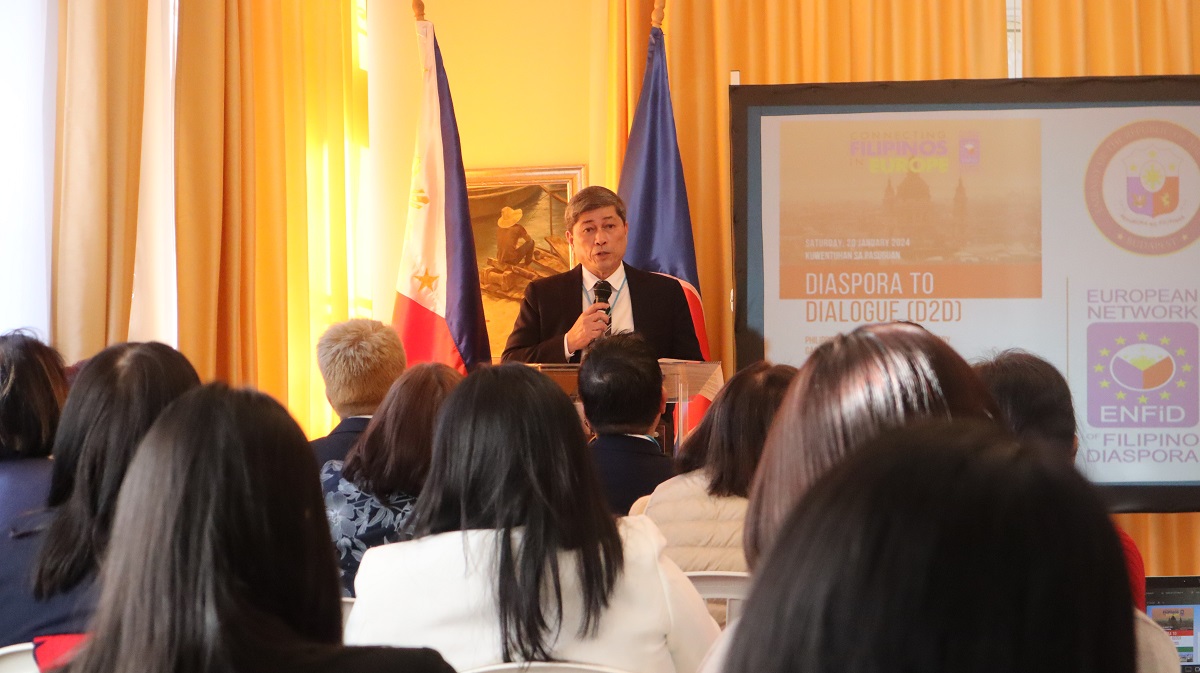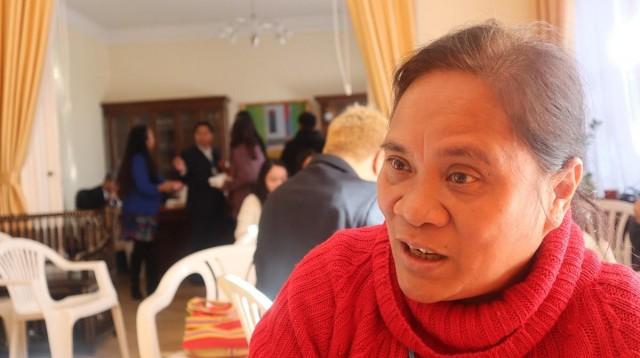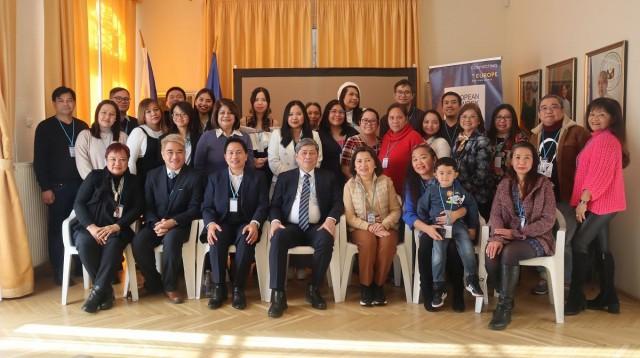Hungary-bound OFWs urged to honor job contracts

BUDAPEST, Hungary – As more Filipinos look for work opportunities in Hungary, senior Filipino diplomats remind them to honor job contracts to avoid labor issues.
Philippine Ambassador to Hungary Frank R. Cimafranca said many Filipino workers coming to Hungary are considered “guest workers” under a newer and stricter immigration law.
“Guest workers” refer to third-country nationals without higher education and are given an initial two-year residence permit for the purpose of employment, which can be extended for one more year. Meanwhile, “highly qualified workers” are third-country nationals with a higher education degree and are entitled to a residence permit allowing them to stay in Hungary for up to three years.
“[For Filipino workers], the possibility of getting a permanent residency [in Hungary] is slim,” Cimafranca said on the sidelines of the Diaspora2Dialogue gathering organized by the European Network of Filipino Diaspora (ENFiD) on January 20 here.
“Sometimes, it is [tempting for] many Filipino workers to go elsewhere, break their contracts, and move to other countries [because Hungary is part of the Schengen area]. I would advise them not to do that because the political climate in Europe has changed.”
Filipinos are among the foreign nationals outside the European Economic Area (EEA) filling Hungary’s labor gap amid Prime Minister Viktor Orban’s hardline stance on immigration and the government’s revamping of labor regulations to protect local workers and jobs.
According to the Philippine Embassy in Hungary, as many as 15,000 Filipinos reside in the Central European country, and 90% are employed at factories as guest workers. That number has increased significantly since December 2020, when there were only 1,000 Filipino workers at the time Cimafranca took his current post.
The Embassy said it expects the number of arriving Filipino workers to increase this year, following Hungary’s announcement of opening its doors to 6,000 more factory and skilled workers from the Philippines.
Earlier this month, the Ministry of Economy announced that the government would issue up to 65,000 permits for guest workers coming from outside of the European Union this year.
“[Hungary] is quite selective and they opened up to only a few countries, and fortunately we are among those included,” Cimafranca said.
“For our countrymen to work here in Hungary is really a big opportunity. So that’s why we should not take it for granted. We should maintain the image of Filipinos being hardworking, amiable, proficient in English, and educated. And after Hungary, there’s always the opportunity to go elsewhere, especially here in Europe.”
Addressing Filipinos’ concerns
Leaders of some Filipino community groups in Hungary who joined ENFiD’s Diaspora2Dialogue gathering spoke about several issues faced by their compatriots, including the language barrier, personal mishaps, and, most especially, employment concerns.
“‘Yung iba kasi, gusto nila kaagad maging milyonaryo. Nagwi-wish sila ng mas mataas na suweldo,” Lisa Ashado-Barchet, president of the Bayanihan Filipino Association, said, referring to “talon nang talon” or Filipino workers moving to different companies or countries without finishing their current job contracts.
(Some Filipino workers want to become millionaires quickly and wish for a higher salary.)

Ashado-Barchet said many Filipinos who sign job contracts are caught unaware of Hungary’s personal income tax rates, levied at 15%, which tempt them to find work elsewhere.
Aside from these, Filipino workers also experience isolation, especially those assigned to factories in the countryside.
Some organized diaspora groups, including the Bayanihan Filipino Association, Mabuhay Filipino Community, and the newly created Association of Filipino Students in Hungary (AFSHU), help Filipinos through their respective Facebook groups.
AFSHu member Camille Jetzselle Fresto, who is a Ph.D. student in Geopolitics and Sustainable Development at Corvinus University of Budapest, said their association is preparing a so-called survival toolkit with explainers about personal income tax, social contributions, and benefits for Filipinos in Hungary.
“There are a lot of misconceptions about employment contracts that need to be clarified. That’s why our organization is trying to make this clear for Filipino workers who are arriving or already here,” Fresto said.
The student group is also pushing for a “shared identity” of Filipinos in the country, following incidents of stereotyping the diaspora as factory workers.
“Before the influx of Filipino migrants in Hungary, Filipinos were known as students, qualified professionals, or [spouses of] Hungarian nationals. But since last year, they have perceived us as a ‘Filipino factory worker’. This is a pressing issue, and this has become a problem between Filipinos … and a nuisance for Hungarians as well,” Fresto shared.
Connecting Filipinos
Meanwhile, ENFiD organized the event to encourage Filipino groups in Hungary to unite and form a chapter in Hungary. Its chapter leaders from the United Kingdom, Italy, Austria, and Czechia also shared their best practices in handling issues faced by Filipinos in their own respective countries.
ENFiD chair Christian W. Estrada from the UK and his colleagues Ana Bel Mayo, Marizel Rojas, and Marison Rodriguez from Italy, Austria, and Czechia, respectively noted the importance of building and leveraging connections in addressing specific challenges.
“ENFiD is all about connecting Filipinos. How do we connect? And then what do we do after we connect? We come up with one voice so we can influence,” Estrada said.

Cimafranca cited the network’s “proud pedigree of community building” and added that the Philippine Embassy recognizes the vital role the pan-European network of Filipinos plays in the government’s comprehensive efforts to unite Filipino organizations throughout Europe.
“[ENFiD] serves as sort of ‘midwives’ for the delivery of what hopefully would be the latest progeny or baby of this network in [Hungary],” he added.
“Everything that we do should be dedicated to our beloved motherland. Through our collective efforts, we aim to contribute to the development and prosperity of the Philippines, promote our shared interests, and uphold the general welfare of all Filipinos wherever they are.” —KBK, GMA Integrated News




